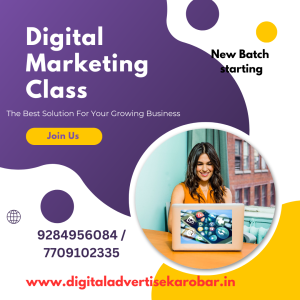Digital Marketing Classes Academy Tuition Course Information

Digital Marketing Classes Academy Tuition Course Information
Digital Marketing Classes Academy Tuition Course Information
Digital Marketing has become a critical tool for businesses to reach their target audience and promote their products or services in the digital space. This field encompasses a wide range of strategies and tactics, including website creation, graphic design, social media, search engine marketing, email marketing, lead generation, and much more.
Website Creation is a fundamental part of digital marketing, as it provides businesses with an online presence and serves as a hub for their marketing efforts. A well-designed website can help a business stand out in a crowded market, build trust with customers, and drive conversions. Website creation involves designing the site’s layout, developing the site’s structure, and creating content that is optimized for search engines.
Graphic Design is an essential part of digital marketing, as it plays a critical role in branding and promoting a business’s products or services. Effective graphic design can help a business stand out in a crowded market, build brand recognition, and drive engagement. Graphic design encompasses a wide range of elements, including logos, images, videos, and animations.
Social Media Marketing is a popular digital marketing strategy that involves promoting a business’s products or services on social media platforms such as Facebook, Twitter, Instagram, and LinkedIn. Social media marketing can help businesses reach and engage their target audience, build brand awareness, and drive conversions. This strategy includes both organic and paid advertising.
Search Engine Marketing (SEM) is a powerful digital marketing strategy that involves promoting a business’s products or services through paid advertising on search engines such as Google, Bing, and Yahoo. SEM allows businesses to reach customers who are actively searching for products or services like theirs, and can be highly targeted to maximize conversions.
Facebook Ads & Marketing is a subset of social media marketing that focuses on promoting a business’s products or services on Facebook. Facebook offers a wide range of advertising options, including sponsored posts, video ads, and carousel ads, that can help businesses reach and engage their target audience.
Google Ads & Marketing is a subset of search engine marketing that involves promoting a business’s products or services through paid advertising on Google. Google Ads allows businesses to target specific keywords, demographics, and geographic locations to reach their target audience and drive conversions.
Digital Marketing Classes Academy Tuition Course Information
Instagram Marketing is another subset of social media marketing that focuses on promoting a business’s products or services on Instagram. Instagram offers a range of advertising options, including sponsored posts, Instagram stories, and carousel ads, that can help businesses reach and engage their target audience.
LinkedIn Ads is a powerful digital marketing strategy that allows businesses to reach a highly targeted audience of professionals on the LinkedIn platform. LinkedIn Ads can be used to promote products or services, drive website traffic, or build brand awareness.
Lead Generation is a critical component of digital marketing, as it allows businesses to identify and cultivate potential customers who have expressed interest in their products or services. Lead generation can be accomplished through a range of tactics, including email marketing, social media advertising, and content marketing.
SMS Marketing involves promoting a business’s products or services through text message campaigns. SMS marketing can be highly effective, as text messages have a much higher open rate than emails or social media posts.
Email Marketing is a tried-and-true digital marketing strategy that involves promoting a business’s products or services through email campaigns. Email marketing can help businesses build relationships with their customers, promote new products or services, and drive conversions.
Google Search Console is a free tool provided by Google that allows businesses to monitor and optimize their website’s performance in search engine results pages. Google Search Console provides insights into a website’s search performance, search appearance, and search traffic.
Google Analytics is a powerful analytics tool that allows businesses to track website traffic, user behavior, and conversion rates. Google Analytics provides insights into how users interact with a website and can help businesses optimize their website for better performance.
Digital Marketing Classes Academy Tuition Course Information
Youtube SEO involves optimizing a business’s video content for maximum visibility on YouTube. This involves using keywords, metadata, and other optimization techniques to increase the chances of a video appearing in search results or recommended videos.
Google AdSense & Analytics is a program offered by Google that allows businesses to earn revenue by displaying ads on their website. AdSense can be an effective way to monetize a website and generate passive income. Google Analytics is used to track the performance of ads, monitor website traffic, and optimize ad placements for better performance.
Affiliate Marketing is a performance-based marketing strategy that involves promoting other businesses’ products or services in exchange for a commission. Affiliate marketing can be an effective way for businesses to generate revenue without having to create their own products or services.
Video Editing is an essential skill for digital marketers who want to create engaging video content. Video editing involves using software tools to manipulate video footage, add special effects, and enhance the overall quality of the video.
Drop Shipping is a popular e-commerce business model that involves selling products without holding inventory. Drop shippers act as a middleman between suppliers and customers, handling the logistics of the sale but not actually storing or handling the product.
Personal Branding is a critical component of digital marketing, as it allows individuals to establish themselves as experts in their field and build a reputation that can be leveraged for career advancement or business success. Personal branding involves developing a consistent voice and visual style across various platforms, including social media, blogs, and websites.
Influencer Marketing is a strategy that involves partnering with influential individuals or social media accounts to promote a business’s products or services. Influencer marketing can be highly effective, as it allows businesses to reach new audiences and build trust with potential customers.
Business Growth Strategy is an essential component of digital marketing, as it helps businesses identify opportunities for growth and develop a plan to achieve their goals. Business growth strategies can include expanding into new markets, launching new products or services, or investing in marketing campaigns.
SMM, or Social Media Management, involves managing a business’s social media accounts to build engagement, increase brand awareness, and drive conversions. SMM includes creating content, responding to comments, and analyzing performance to optimize social media campaigns.
SEO, or Search Engine Optimization, is the process of optimizing a website’s content and structure to rank higher in search engine results pages. SEO involves a range of tactics, including keyword research, content creation, and link building.
SEM, or Search Engine Marketing, is a digital marketing strategy that involves promoting a business’s products or services through paid advertising on search engines. SEM allows businesses to target specific keywords, demographics, and geographic locations to reach their target audience and drive conversions.
In conclusion, digital marketing encompasses a wide range of strategies and tactics that businesses can use to reach their target audience and promote their products or services in the digital space. By mastering skills such as website creation, graphic design, social media management, search engine optimization, and lead generation, businesses can build a powerful digital presence that drives growth and success.
Digital Marketing Classes Academy Tuition Course Information
To be successful in digital marketing, it’s important to stay up to date with the latest trends and technologies. This can involve attending industry conferences, networking with other professionals, and constantly learning new skills. Here are a few additional topics to consider when diving deeper into digital marketing:
Content Marketing: This is a strategy that involves creating and sharing valuable, relevant, and consistent content to attract and retain a clearly-defined audience. Content marketing can include blog posts, social media content, videos, and more.
Mobile Optimization: With more and more people accessing the internet from mobile devices, it’s critical to ensure that your website and digital content is optimized for mobile viewing. This can involve using responsive design, minimizing load times, and designing for small screens.
Voice Search: As more people use voice assistants like Siri, Alexa, and Google Assistant, optimizing your website and content for voice search is becoming increasingly important. This involves using natural language and long-tail keywords to align with the way people speak when using voice search.
Chatbots: Chatbots are an AI-powered tool that can help businesses automate customer service and lead generation tasks. By setting up a chatbot on your website or social media channels, you can engage with customers in real-time and provide immediate support.
Augmented Reality: Augmented reality (AR) is a technology that allows users to interact with virtual objects in the real world. AR can be used in digital marketing to provide immersive experiences that help customers visualize products or services.
Virtual Events: With the COVID-19 pandemic driving the move towards virtual events, it’s important for businesses to learn how to leverage digital platforms to engage with audiences. This can include hosting webinars, online conferences, or virtual product launches.
Local SEO: For businesses that operate in a specific geographic area, local SEO can be an effective way to improve search engine rankings and drive traffic to a physical location. This involves optimizing content for local keywords, using Google My Business, and building local backlinks.
By continually expanding your digital marketing knowledge and skill set, you can build a competitive advantage in the digital landscape. Whether you’re an entrepreneur looking to grow your business or a marketer seeking new opportunities, there are endless opportunities to succeed in the exciting and ever-changing world of digital marketing.
A: Digital marketing is the process of promoting products, services, or brands using digital technologies such as the internet, social media, search engines, mobile devices, and other digital channels.
A: Digital marketing can offer many benefits, including increased brand awareness, higher website traffic, improved customer engagement, and increased sales and revenue.
A: Some of the most common digital marketing channels include social media, search engine marketing (SEM), search engine optimization (SEO), email marketing, mobile marketing, and content marketing.
A: There are many metrics that can be used to measure the effectiveness of digital marketing campaigns, including website traffic, conversion rates, engagement rates, click-through rates (CTR), and return on investment (ROI).
A: SEO stands for search engine optimization, which is the process of optimizing a website to improve its rankings on search engine results pages (SERPs). This can involve optimizing content, using keywords, building high-quality backlinks, and improving website speed and usability.
A: SEM stands for search engine marketing, which is a type of digital marketing that involves using paid advertising to appear at the top of search engine results pages. This can involve using platforms like Google Ads or Bing Ads to bid on specific keywords.
A: Social media marketing is the process of using social media platforms like Facebook, Instagram, Twitter, and LinkedIn to promote products or services, build brand awareness, and engage with customers.
A: Effective content should be informative, engaging, and relevant to your target audience. It should also be optimized for search engines, shareable on social media, and designed to drive conversions and sales.
A: Email marketing can be a powerful tool for driving business results like increased website traffic, higher engagement rates, and increased sales. To be effective, email campaigns should be personalized, well-designed, and optimized for mobile devices.
A: Building a strong brand presence online can involve a combination of tactics like creating quality content, engaging with customers on social media, optimizing your website for search engines, and building backlinks from authoritative sources.
A: Some of the key skills needed to succeed in digital marketing include creativity, analytical skills, technical skills, writing skills, communication skills, and the ability to adapt to changing technologies and trends.
